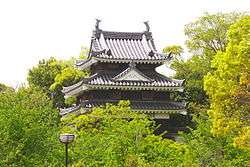Nishio Domain
Nishio Domain (西尾藩, Nishio han) was a feudal domain of the Tokugawa shogunate of Edo period Japan, located in former Mikawa Province, in what is now the modern-day city of Nishio in Aichi Prefecture, Japan. It was centered on Nishio Castle.

History
When Tokugawa Ieyasu became independent of the Imagawa clan in 1561, he established Nishio Castle, and assigned his close hereditary retainer, Sakai Masachika to become its first castellan. It was a mark of Ieyasu’s favor and trust, as Sakai Masachika was the first of Ieyasu’s retainers to be so honored. Following the Battle of Sekigahara, the Sakai clan was reassigned to more lucrative territories in western Japan, and was replaced by a branch of the Honda clan as first rulers of the new Nishio-han. The domain changed hands with almost every generation, reverting for periods to tenryō status under direct control of the Tokugawa shogunate. The Doi clan held the territory for almost 100 years (1663-1747), and the Ogyu branch of the Matsudaira clan from 1764 until the Meiji restoration in 1867. The final daimyō, Matsudaira Noritsune, took part in the Second Chōshū expedition, and was assigned to guard Osaka and Kyoto, but presided over domain deeply divided between pro- and anti- Shogunal factions. He surrendered to the new Meiji government during the Boshin War, after the defection of many junior samurai to the pro-Imperial cause. The domain had a population of 55,220 people in 13,039 households per the 1867 census, of whom 51,119 people were classed as farmers. The domain maintained its primary residence (kamiyashiki) in Edo at Daimyo-koji, in Marunouchi. Until the An’ei period (1772-1781)[1] Nishio Domain was not a single contiguous territory, but consisted of many widely scattered holdings, which at the end of the Edo period consisted of:
- Mikawa Province: 112 villages in Hazu, 19 villages in Kamo, 7 villages in Nukata, 4 villages in Hoi, 1 village in Hekikai
- Suruga Province: 8 villages in Kitō, 2 villages in Haibara, 1 village in Fuji, 1 village in Suntō,
- Echizen Province: 27 villages in Nyū, 7 villages in Nanjō District, Fukui, 3 villages in Sakai
After the abolition of the han system in July 1871, the domain became “Nishio Prefecture”, which later became part of Nukata Prefecture, and finally Aichi Prefecture.
List of daimyō
| # | Name | Tenure | Courtesy title | Court Rank | kokudaka | Lineage |
|---|---|---|---|---|---|---|
| 1 | Honda Yasutoshi (本多 康俊) | 1601–1617 | Nui-no-suke (縫殿助) | Lower 5th (従五位下) | 20,000 koku | 2nd son of Sakai Tadatsugu |
| 1 | Matsudaira Narishige (松平 成重) | 1617–1621 | Ukon-no-jō (右近将監) | Lower 5th (従五位下) | 20,000 koku | transfer to Kameyama Domain |
| 1 | Honda Toshitsugu (本多 俊次) | 1621–1636 | Shimōsa-no-kami (下総守) | Lower 5th (従五位下) | 35,000 koku | son of Honda Yasutoshi; transfer to Kameyama Domain |
| 1 | Ōta Sukemune (太田 資宗) | 1638–1644 | Bitchu-no-kami (備中守) | Lower 5th (従五位下) | 15,000 –> 35,000 koku | transfer from Yamakawa Domain; 2nd son of Ōta Shigemasa; transfer to Hamamatsu Domain |
| 1 | Ii Naoyoshi (井伊 直好) | 1645–1659 | Hyōbu-no-shō (兵部少輔) | Lower 5th (従五位下) | 35,000 koku | transfer from Anaka Domain; son of Ii Naokatsu; transfer to Kakegawa Domain |
| 1 | Mashiyama Masatoshi (増山 正利) | 1659–1662 | Danjō-shōhitsu (弾正少弼) | Lower 5th (従五位下) | 20,000 koku | son of Aoki Toshinaga |
| 2 | Mashiyama Masamitsu (増山 正弥) | 1662–1663 | Hyōbu-no-shō (兵部少輔) | Lower 5th (従五位下) | 20,000 koku | son of Nasu Tsukemutsu; transfer to Shimodate Domain |
| 1 | Doi Toshinaga (土井 利長) | 1663–1681 | Hyōgo-ryō (兵庫頭) | Lower 5th (従五位下) | 23,000 koku | 2nd son of Doi Toshikatsu |
| 2 | Doi Toshimoto (土井 利意) | 1681–1724 | Yamashiro-no-kami (山城守) | Lower 5th (従五位下) | 23,000 koku | 7th son of Inaba Masanori |
| 3 | Doi Toshitsune (土井 利庸) | 1724–1734 | Awaji-no-kami (淡路守) | Lower 5th (従五位下) | 23,000 koku | adopted from Miura clan |
| 4 | Doi Toshinobu (土井 利信) | 1734–1747 | Iyo-no-kami (伊予守) | Lower 5th (従五位下) | 23,000 koku | son of Toshinaga; transfer to Kariya Domain |
| 1 | Miura Yoshisato (三浦 義理) | 1747–1756 | Kazue-no-kami (主計頭) | Lower 5th (従五位下) | 23,000 koku | son of Akihiro; transfer from Kariya Domain |
| 2 | Miura Akitsugu (三浦 明次) | 1756–1764 | Hyōgo-ryō (兵庫頭) | Lower 5th (従五位下) | 23,000 koku | 3rd son of Akitaka; transfer to Katsuyama Domain |
| 1 | Matsudaira Norisuke (松平 乗祐) | 1764–1769 | Izumi-no-kami (和泉守) | Lower 5th (従五位下) | 60,000 koku | son of Norisato; transfer from Yamagata Domain |
| 2 | Matsudaira Norisada (松平乗完) | 1769–1793 | Izumi-no-kami (和泉守) | Lower 4th (従四位下) | 60,000 koku | 4th son of Norisuke |
| 3 | Matsudaira Norihiro (松平 乗寛) | 1793–1839 | Izumi-no-kami( 和泉守) | Lower 5th (従五位下) | 60,000 koku | son of Norisada |
| 4 | Matsudaira Noriyasu (松平 乗全) | 1839–1862 | Izumi-no-kami (和泉守) | Lower 4th (従四位下) | 60,000 koku | son of Norihiro |
| 5 | Matsudaira Noritsune (松平 乗秩) | 1862–1871 | Izumi-no-kami (和泉守) | Lower 5th (従五位下) | 60,000 koku | 2nd son of Norihiro |
References
- Papinot, E (1910). Historical and Geographic Dictionary of Japan. Tuttle (reprint) 1972.
External links
- (in Japanese) Nishio Domain on "Edo 300 HTML"
Notes
- Edo daimyo.net (in Japanese)